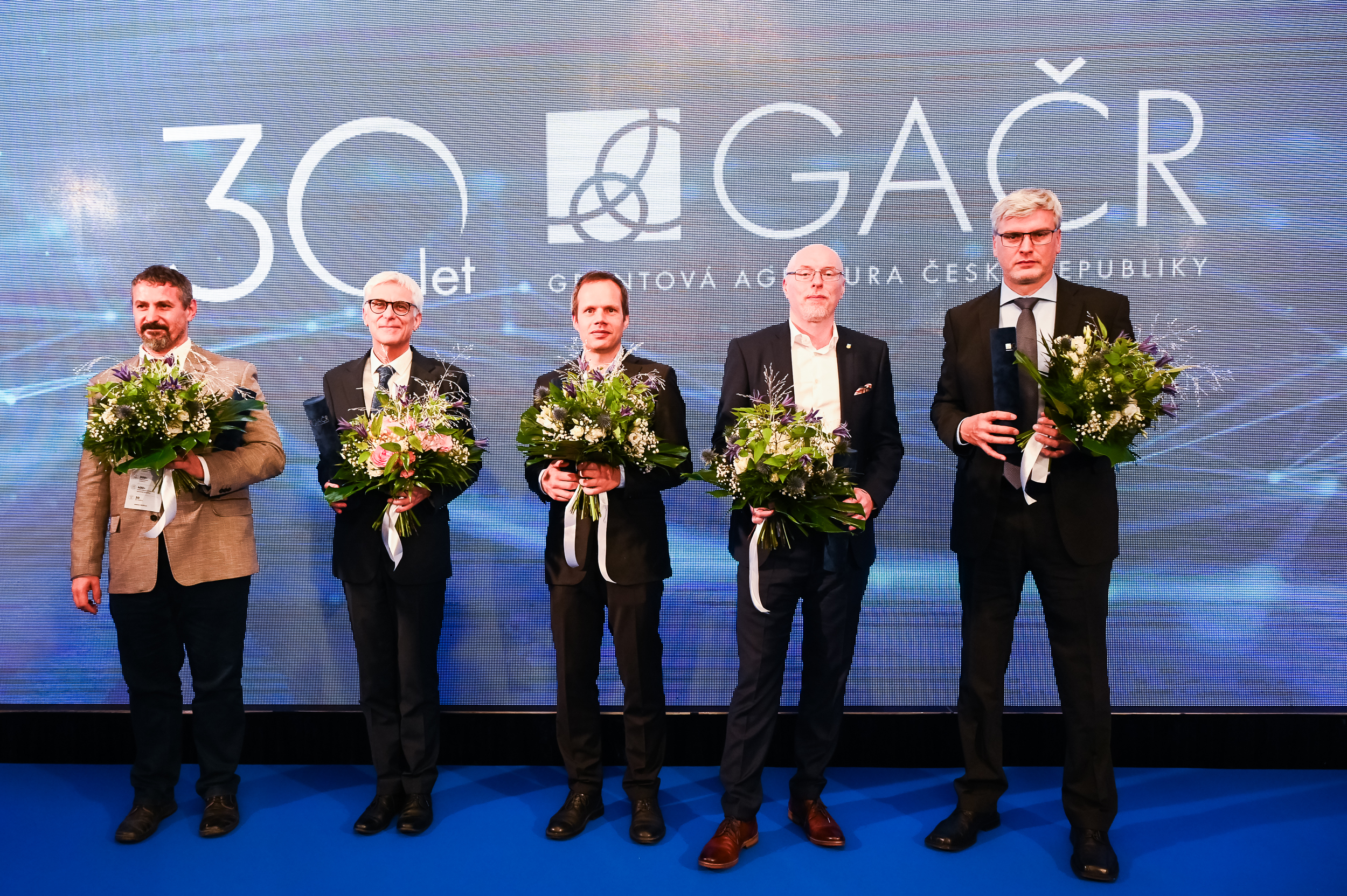
The President of the Czech Science Foundation (GACR) together with the Minister for Science, Research and Innovation awarded the five best scientific projects at the 20th anniversary ceremony of the Czech Science Foundation President’s Awards yesterday (12 October 2023) at the Martinský Palace. The award recipients from all areas of basic research have contributed to a significant expansion of knowledge in the field and will lead to further applications.
The winning projects will contribute to the comprehension of black holes, the functioning of the vertebrate brain, and the communication strategies of politicians. The other award-winning research has the potential to contribute to more effective cancer treatments and improved lubrication of human joints.
“We have awarded the best of projects over the last twenty years – ninety of them in that time. The breadth of the award-winning projects shows that Czech science is world-class in all fields of research,” said Prof. Petr Baldrian, Czech Science Foundation President. “Like the years before, this year it was extremely difficult to select the best projects, because if a project receives funding from the Czech Science Foundation, it is almost guaranteed to be high-quality research thanks to our evaluation system.”
The Czech Science Foundation President’s Award has been regularly awarded since 2003 in recognition of outstanding results achieved in grant projects completed in the previous year. Recipients are selected on the recommendation of several hundred scientists who evaluate projects funded by the Czech Science Foundation. Each winner will receive a prize of CZK 100,000. The awards are presented in five areas of basic research: Technical Sciences, Physical Sciences, Medical and Biological Sciences, Social Sciences and Humanities, and Agricultural and Biological-Environmental Sciences.
The award ceremony took place as part of the celebration of the Czech Science Foundation’s 30th Anniversary, attended by Helena Langšádlová, Minister for Science, Research and Innovation, Miloš Vystrčil, President of the Senate of the Parliament of the Czech Republic, representatives of universities, the Czech Academy of Sciences, and dozens of other distinguished guests.
Award-Winning Projects
Technical Sciences
prof. Ing. Martin Vrbka Ph.D., Brno University of Technology, Faculty of Mechanical Engineering
Investigation of Synovial Fluid Viscosupplementation and its Impact on Friction and Lubrication
Viscosupplementation is a treatment for osteoarthritis that involves injecting a hyaluronic acid-based product between the cartilages of a joint. The award-winning project investigated whether this treatment could improve the mobility of joints. The project created a joint simulator that analysed the friction and lubrication film between the articular cartilage. The project has clarified the mechanism of viscosupplementation, and provided new insights to improve the treatment of osteoarthritis.
Physical Sciences
Roman Konoplya Ph.D., Silesian University in Opava, Institute of Physics
Testing Strong Gravity via Black Holes
The project has developed a new method for describing black holes in various theories of gravity, including those that differ from the prevailing Einstein theory. The differences between the theories are most apparent in the extremely strong gravity around black holes. This new method makes it possible to study these differences and to combine theory with experiment to help understand gravity under extreme conditions. This way, the project contributes to a full understanding of gravity and its potential applications in energy and other areas of research.
Medical and Biological Sciences
Mgr. Jakub Rohlena, Ph.D., Institute of Biotechnology, Czech Academy of Sciences
Respiration-Linked Metabolic Limitations of De Novo Pyrimidine Biosynthesis
The project investigated the metabolism of cancer cells, which influences their ability to form tumours and respond to treatment. The chain responsible for cellular respiration was found to have different functions in dividing and resting cells – the former promoting the production of organic compounds, the latter stress resistance. This difference has important implications for cancer treatment which can affect not only cancerous cells but also healthy ones. The project also discovered a new metabolic pathway that produces a key substance for cancer cell growth – aspartic acid. These findings may contribute to new innovative cancer treatments.
Social Sciences and Humanities
Mgr. Alena Kluknavská, Ph.D., Masaryk University, Faculty of Economics and Administration
Contestation of Truth: Public Discourses on Migration in Central Europe in the Post-Truth Era
The award-winning project dealt with the relativisation of truth in political communication, where facts give way to opinions. It created a theoretical framework and a tool for analysing the post-factual communication of politicians, especially in the context of polarising issues such as migration. By combining manual and automatic textual analysis, the researchers found that post-factual communication is close to both populism and disinformation. It manifests itself primarily through hostile anti-elitist accusations against opponents of creating and spreading false information and lies, and a focus on emotionality, negativity and incivility rather than facts and expertise.
Agricultural and Biological-Environmental Sciences
Mgr. Pavel Němec, Ph.D., Charles University, Faculty of Science
Evolution of Brain Complexity and Processing Capacity in Amphibians and Reptiles: A Quantitative Approach to Understanding Tetrapod Brain Evolution
The brain and its neural capacity are crucial to the evolutionary success of species. However, even species with small brains can be intelligent because of the high density of neurons in the brain. The project researchers found that birds and mammals – unlike amphibians and reptiles – have experienced brain enlargement and an increase in the number of neurons during evolution, made possible by the increased metabolism of species with constant body temperature. Furthermore, a link between the number of neurons in the hindbrain and cerebellum and the innovativeness of birds in acquiring food has been demonstrated.